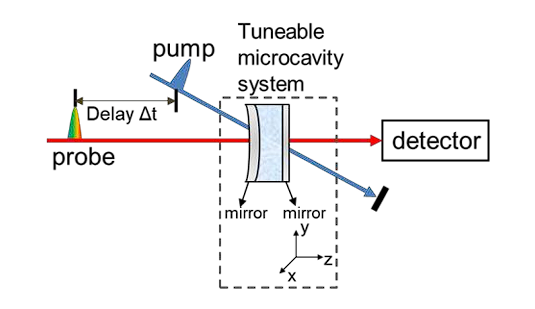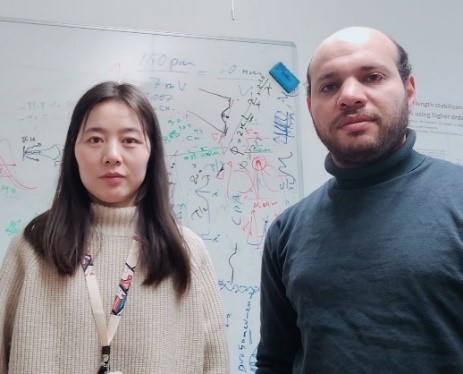From an idea that stemmed from the broad scientific interest in exploring the impact of confined electromagnetic fields on material properties, Fan Wu and Abdullah Abdelatief teamed up to investigate material-electromagnetic field interactions via a tuneable microcavity system and ultrafast spectroscopy. Their project is one of the five awarded a Light & Materials Young Investigator Award in 2023.
The project revolves around studying the interactions between materials and confined electromagnetic fields. The project aims to systematically study how this interaction, ranging from weak to strong coupling regimes, modifies dynamic processes in various systems, such as photosynthetic units, solar cell films, and rare-earth ion-doped nanoparticles, with a combined setup of a tuneable microcavity system and ultrafast pump probe spectroscopy.
The utilization of Fabry Perot optical microcavities is a well-established method for mediating the light-matter interaction. To address the challenges associated with traditional microcavity sample fabrication, Fan and Abdullah propose the development of a tuneable microcavity system, allowing for easy adjustments of the cavity resonance frequency and mode volume, providing a versatile platform for studying a wide range of materials and coupling strengths. The integration with ultrafast pump probe spectroscopy further enhances the capability to study dynamic processes in real-time. The project’s motivation lies in the potential applications of these findings in optimizing devices like artificial photosynthetic devices, solar cells, and exploring rare-earth ion-doped nanoparticles for quantum computing.

This project connects light and material in two ways. One is the coupled microcavity system which mediates the interaction between the materials inside the cavity and the light mode of the cavity. Also, the dynamics of the coupled microcavity system (material part) will be studied by the ultrafast laser technique-pump probe spectrometer (light part).
A better understanding of the dynamics of the coupled microcavity system and the discovery of the optimal light-matter coupling conditions (strong, weak or intermediate coupling strength) would help the design of artificial photosynthetic devices and solar cell devices and the application of rare-earth ion doped nanoparticles as quantum qubits.
About the team

This project is led by Dr. Fan Wu, a postdoc in Chemical Physics, and Abdullah Abdelatief, a PhD student in Atom Physics. Fan’s expertise in strong light-matter interactions and ultrafast pump probe spectroscopy complementing with Abdullah’s proficiency in building high-precision tuneable microcavity systems and weak light-matter interactions perfectly combines light and material and ensures the successful implementation of the project.
Read about the other projects granted the Light & Materials Young Investigator Award 2023:
- Harnessing Cutting-Edge Light sources in Lund for Insights and Applications of Synthesized Carbonaceous Nanoparticles
- Light-Driven Material Optimization
- Optimizing New Generation Sustainable GaInP Nanowire based micro-LEDs (μ-LEDs) with AI-Enhanced Functional Imaging
- Studying the temporal dynamics of light driven coherent electron waves in nano structures
